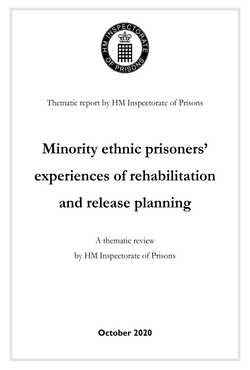Minority Ethnic Prisoners' Experiences of Rehabilitation and Release Planning
By Hindpal Singh Bhui, Rebecca Stanbury. et al.
Black and minority ethnic (BME) groups are greatly overrepresented in the prison population: as of March 2020, 27% of prisoners were from a BME background, compared with only 13% of the general population. People who identify as ‘black’ are imprisoned at an even more disproportionate rate: they comprise only 3% of the general population but 13% of adult prisoners (UK Prison Population Statistics, 2020). HM Inspectorate of Prisons (HMI Prisons) inspection reports consistently show that BME prisoners report worse experiences and outcomes than white prisoners across a wide range of indicators covering most areas of prison life. The Lammy Review (published in 2017 and subtitled ‘An independent review into the treatment of, and outcomes for, Black, Asian and Minority Ethnic individuals in the Criminal Justice System’) drew extensively on HMI Prisons’ evidence and other sources to highlight under-identification of BME prisoners’ vulnerabilities, widespread feelings among BME prisoners of being treated less well than white prisoners and shortcomings in important systems of redress and internal assurance. People from a BME background have less trust in the criminal justice system than white people and worse perceptions of the system’s fairness, whether or not they have had any significant involvement in it (Lammy, 2017). The reasons for these perceptions are complex and under-researched, and result not just from criminal justice processes, but also from long-term patterns of social inequality and prejudice (Bhui, 2009). Developing a greater understanding of the perceptions of prisoners and disproportionalities in the prison system, and finding ways to address them, is an important task for those working in prisons. This thematic review is a small but original contribution to that effort. We will consider carefully how the findings might be built upon in future work. Little has been written on BME prisoners’ experiences of offender management and resettlement services, and there is very limited work on the increasingly influential concept of ‘rehabilitative culture’ and the degree to which efforts to achieve it have taken account of the specific experiences of BME prisoners.
London: Her Majesty’s Inspectorate of Prisons, 2020. 58p.


